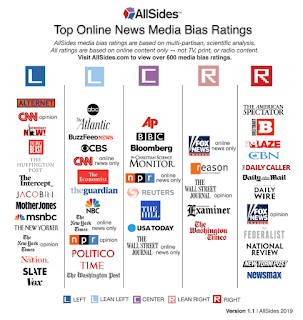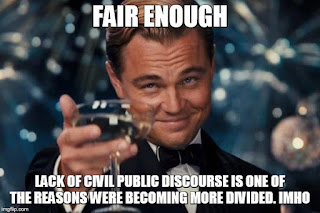How Did We Get Here? Biased News in the 21st Century
Ah, 2020. Year of the COVID-19 pandemic, a presidential election, a Capitol insurrection, and arguably one of the most divisive times in modern American history. I know a lot of people ask the question, “how did we get to this point?” I argue that there are many different reasons as to why/how we as a nation are at the point we are now. As we are all enrolled in this wonderful class titled writing and reading public discourse; I think it would be appropriate to write about just that: public discourse in America and the reason it has gotten so intense.
Let’s start with a little refresher: what is public discourse? Simply put, public discourse is the public stating opinions or thoughts about a certain topic. A debate is a great example of public discourse, as are speeches, presentations, videos, articles, the news, etc.
With this in mind, let’s think about how/where we get our information from. This is important to think about because where we get information from directly affects public discourse: it affects how we will debate, give speeches, presentations, as well as what videos, articles, and news we watch. I, like a lot of people, get information from social media. Twitter is my main source of quick news and I am literally a political science major.
In my opinion, this very reason is one of, if not the biggest, reason for our intense public discourse today. Let’s be real, I could very well be reading completely biased and false information about events and stories. I of course hope I have enough knowledge about certain topics that I can weed out falsities (I am going to college for this ya know), however do I know for sure that everything I read is truthful? I am a part of the issue. My grandparents sitting on FaceBook sharing obviously biased and misinformed articles are the issue. Biased news channels like Fox News and MSNBC are the issue. We have such intense public discourse today because everyone thinks they are right. Everyone thinks they are right because of the information we see, hear, and read.
If we are to move forward as a nation we must be willing to do our own research, listen to others, and hold others accountable. We must be willing to hold news sources, social media, and politicians accountable for the things they share as well. Believe it or not, I have to stop getting news from Twitter if I am not looking more into the issue afterwards. To solve our public discourse issue, we must stand together.
Overly optimistic? Probably. Realistic? I think so. We are more connected than ever before and have access to more information than any other time in history: it's time we start acting like it.


I think the toughest part about properly informing ourselves is determining where to get out information. Every person I've recommended a book to at Ball State (even the Honors students) has said something along the lines of, "the last time I read a book (not for school) was in like junior high school". I know I'm in the minority, but I get my facts and news through books--I practically eat them for breakfast, and I snack on biological studies. I read the dictionary in elementary school, for cryin' out loud.
ReplyDeleteOur current priorities are pretty obvious--people spend most of their days on TikTok (never been on it), rather than consuming articles about the genetic procedure which produced Elizabeth Ann, the first North American cloned mammal (a black-footed ferret--I couldn't be any more pleased!).
But for the rest of our generation whose short attention span (due to social media and fast facts) finds reading a novel awfully cumbersome, It's practically impossible to obtain unbiased information; even the news is falsified, biased, or exaggerated. So I think that in this age of flash news and social media, everyone doing their research is pretty unrealistic (most unfortunately) since it takes too much focus and attention, and we likely won't be backpedaling into credibility or objective truth ever again (cue the tears). It's tragic, truly, but it's the unfortunate destiny of the "United" states whose attention has been divided heavily by social media.
I agree that where we choose to get our information from can have an immense impact on public discourse/properly informing ourselves. Much like you, I get a majority of my information from Twitter; however, I also equip other social medias. Basically, I get information from everywhere except for the news - I just don't trust it. It's almost funny to think about, seeing as I trust social media (where anyone can post anything) more than the news...I think they've tainted their reputation for at least the near future.
ReplyDeleteYour mentioning of everyone standing together is both encouraging and discouraging. I find it encouraging because I see what you're saying, and with your solution I see that there is hope for the future of our public discourse and overall informational intake. On the other hand, I find it discouraging because I severely lack confidence in Americans when it comes to "standing together" - after all, past experiences have shown that we, as Americans, have a difficult time with listening to others, putting opinions to the side, and overall coming together to support a bigger cause. I truly do hope that you're right when it comes to the realistic nature of this solution...I think it would be the first step in fixing our nation's ever-growing issues.
Do you think the iconic stereotype of the laziness of Americans contributes to our lack of interest when checking the truths of an article, or do you mainly think it is that we want to believe what we want to believe? As a photojournalism major, this year was rather chaotic in the world of journalism. To have all of the events listed above happen during a pandemic is the craziest of all. I have actually seen that chart that you show before. I saw a few different ones in my introduction journalism class. It is truly fascinating to see where news companies land in the spectrum of liberal versus conservative. I think it is also interesting that, many times, we are told sources like The New York Times, CNN, and NPR are great to get sources from, when in fact, they have their own biases. To truly eliminate the biases in the world, we must take it upon ourselves to find the truth and fact check what we read. However, laziness and stubbornness are diseases that lay inside our minds, corrupting us and preventing us from truly finding the truth in the news.
ReplyDeleteI almost feel as if you are trying to tackle a symptom rather than the disease. You appear to have placed the blame on the consumer, but you never faulted the people putting out these obviously biased, misinformed, and actively detrimental pieces of information. In my mind, a sceptical public will only go so far. We can’t (won’t) be on guard for everything we ever read. It only takes one mistake for even a careful consumer to mess up really bad. As long as there are people putting out deceitful information, there will still be those who believe it.
ReplyDeleteIn order to combat this disease, there would need to be some sort of (better) regulation(s) on news outlets and public figures as a whole. There would need to be some actual consequences for businesses, individuals, and governments that can be proven to actively deceive the people they are supposed to serve. I imagine that is easier said than done though. I know that proving deceitful intent can be nigh impossible. It might be better to do away with intent and focus on results; if they were misleading then they should be punished.
Or maybe I’m suggesting some sort of dystopian hellscape where all public discourse is regulated by. . . someone? Presumably someone in power.